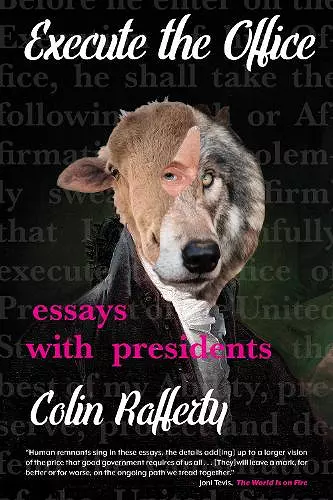Execute the Office
Essays with Presidents
Format:Paperback
Publisher:Cameron & Company Inc
Published:15th Apr '21
Should be back in stock very soon

∙ Author Tour
∙ Print and Broadcast Campaign
∙ Social Media Campaign
∙ National Review Campaign
Colin Rafferty's Execute the Office uses lyric prose and formal invention to explore the humanity, or lack thereof, that thrived in each of the forty-five American presidents. Whether these powerful individuals were celebrated for infamous deeds and heroism, or forgotten as placeholders in the annals of American history, too often presidents are commemorated by the sterility of simple fact. Execute the Office builds upon factual accuracy with essays that are equally invested in lyricism and experimental forms. To balance these factions, Execute the Office uses constraint, metaphor, allusion, and epiphany to explore not just the facts and artifacts of history, but describe the connections between those facts and human nature. These essays discuss the modes in which we remember through death songs, footnotes, infinite rooms, evacuation routes, and nomenclatures, to name a few examples, engaging with history from fresh perspectives. Execute the Office contains histories in and of unusual objects. While unfamiliar at first, they soon become distinct, unforgettable, profound, human.
Colin Rafferty's Execute the Office isn't a dullard's history book and these aren't the usual stories you've heard about our presidents. This is a lyrical romp through American history. With a healthy appreciation for the ridiculous and a keen understanding of the horror and beauty of the American Experiment, Rafferty delivers a strange, wondrous history of the American Presidency that is unlike any other book on the subject. - Jesse Donaldson, author of On Homesickness and The More They Disappear
I was afraid “curation” might now be dead to us, its potency to mean, to arrange compelling presentations, to animate the residue of fact (things done) rendered ruined, meaningless by too ready-to-use overuse. But here is Colin Rafferty’s Execute the Office reviving the valence of curation, a compilation of exquisite formalistic but not formulaic essays, cataloguing America’s forty-five chief executives. Rafferty returns the Muse to the museum, a dioramic taxidermist of prose, posing each exhibit in its unique hide from head to toe-note. Curator sublime, Rafferty’s collection of brief lives cure as they brine and pickle, adding taste and flavor as they preserve what’s alive in all this death. These essays, lyric sutures, heal, too, as they heel history (selected perceptions and precise amplifications), bringing every president, even the living ones, back to life. - Michael Martone, Author of The Moon Over Wapakoneta and Brooding
Colin Rafferty's Execute the Office is smart, compelling, and gloriously inventive. Rafferty reminds us that history is made of people as much as events, and the men who've brightened or darkened the American Presidency are flawed and fascinating, majestic (sometimes) and mercurial. A sure-footed and splendid history lesson. - Dinty W. Moore, Author of To Hell with It: Of Sin and Sex, Chicken Wings, and Dante's Entirely Ridiculous, Needlessly Guilt-Inducing Inferno
Writes Colin Rafferty at the outset of his newest book of nonfiction, Execute the Office, "To dance the minuet, the reel, you have to know the steps. In America, we are always rediscovering the steps of the dance, trying to recreate it from the remnants we can find in our soil." Those human remnants sing in these essays, as we learn about Millard Fillmore's graceful handwriting; about the tragedy of Franklin Pierce's life, told in the form of an ongoing medical chart; about the rows of stitches, sewn XXXX, by tailor Andrew Johnson. The details add up to a larger vision of the price that good government requires of us all. A military warehouse full of medals in boxes, waiting for recipients or survivors. As Rafferty muses, Johnson's "legacy [is] a reminder that this country's lie—anyone can be president—means that the wrong person can become president." And will leave a mark, for better or for worse, on the ongoing path we tread together. - Joni Tevis, author of The World Is on Fire
In the striking essays of Execute the Office, Colin Rafferty reconciles the office of the presidency with the men who’ve held it.
Framed by a trip to the National Museum of American History, the entries meander through an exhibit devoted to the burdens of the presidency. Each essay is headed by its focal president’s name, numerical placement, and term, as well as by a countdown to and from three major turning points in presidential history: the adoption of the Constitution, the signing of the Emancipation Proclamation, and President Richard Nixon’s resignation. Though presidents are often regarded as great individuals, Rafferty shows that “this job murders men,” covering presidents who died in office from sickness or assassination; even presidents who passed away after their terms are used to show that the office takes a toll on those who assume it. The book includes presidents’ personal struggles with depression, alcoholism, and PTSD, too, and addresses national trials around racism and prejudice, as codified in the Indian Removal Act, Jim Crow laws, Chinese exclusion, and Japanese internment, all of which are linked to a president’s actions or inaction.
Rafferty’s experimental style matches each president with a form that best suits them. The entirety of “Reiteration,” focused on John Adams, is a footnote. “Diagnosis,” a look at the fractured pain of Franklin Pierce, is written as patient notes and a treatment plan. Ronald Reagan, the Hollywood president, is the subject of the script “Dissolve To.” Hurricane categories progress as “Evacuation Route” maps the presidency of George W. Bush, plagued at both ends by human-made and natural disasters. A forty-sixth presidential essay, “Enfranchisement,” imagines the inauguration press release with a fill-in-the-blank format.
Execute the Office illuminates the human beings who’ve occupied the Oval Office, showing the reach of each of their decisions. - DONTANÁ MCPHERSON-JOSEPH (Foreword ReviewsJanuary / February 2021)
ISBN: 9781936097326
Dimensions: 203mm x 134mm x 6mm
Weight: unknown